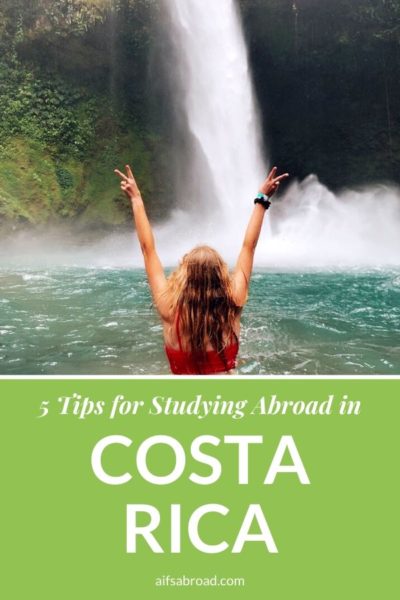Are you planning to study abroad in Costa Rica? Here are five things to know before you go.
1. Safety first
Remember: you are traveling to a foreign country with different laws and customs. There may be times that you feel out of place. It is important to listen to your gut; sometimes it’s better to drive places than to walk, and you should always have at least one or two buddies going with you. This is good practice for visiting any new country or city.
Once you arrive to study abroad in Costa Rica, the AIFS staff gives an orientation on safety and provides multiple useful resources if you ever find yourself in an unsafe situation. If I ever had a safety concern, I felt comfortable going to them. Veritas University also has an in-depth orientation on safety and Costa Rican culture. I always felt safe on campus and walking back to my homestay because of the security guards that patrolled the school. The university also has a bus that picks up and drops off students at their homestays if they choose to sign up. If you have any more questions regarding the program and safety, feel free to contact AIFS!
2. Explore outside of San José
When you study abroad in Costa Rica, you should have some free weekends where you will be able to get out of the city and explore more of the country. I highly recommend taking advantage of these weekends and visit some beaches, forests, or volcanoes.
AIFS provides many program-led excursions, but if you’d like to plan your own, the key is to plan ahead and make sure you research and read reviews on where you’re going and staying. While I was abroad, I only had one free weekend. A few of my friends from my program and I decided to go to Limon—which I highly recommend for others to visit as well. We took the public bus there and had to get our bus tickets in advance at the station. We didn’t buy our returning tickets until we got there. I brought a book to make the time on the bus go by faster. We found a nice Airbnb, which accommodated all of us perfectly. I think Airbnb is a great option for finding places to stay, but be sure to look into the place and the person you’re paying, just like you would anywhere else.
Some other great options are hostels — which are more on the inexpensive side — or hotels, which you can split with multiple people to save money! I learned that talking with the locals will help you discover the best places to go around the area you’re visiting. The locals were always helpful if we had any questions and gave great suggestions on restaurants, beaches, and trails within the area.
3. Make the most of your time after or between classes
The city of San José has many hidden treasures and great places to eat after or between classes. Since we had a limited amount of time in between classes and our included weekend excursions, it was sometimes tough to find places to go nearby. During my hour break from class, I would often walk to get coffee somewhere close by with classmates to take back to class. After class, there are many there are many local sodas, or small restaurants, where you can find food for lunch — or you can get a typical Costa Rican meal at either of the two dining halls located at the university. I recommend trying as many different places as you can while you are in Costa Rica during your downtime. I was never disappointed by a meal I had.
If you’re looking for things to do in San José that aren’t food related, you’re in luck — there are many! You can walk around downtown, visit museums or local parks, go to the mall, or check out the Doka Coffee farm and get a tour. My Spanish professors and Mama Tica told me about different close-by places that I could go after class for food or sight-seeing, so you can always ask them if you want any more suggestions!
4. Let’s talk money
I highly recommend going to your bank and exchanging money before going abroad. I found that doing so will help you get the best exchange rates compared to many airports in the United States and the banks in Costa Rica. However, make sure to make the exchange request to your bank in advance because they most likely will need to order the currency for you. Be sure to check the exchange rate before requesting for how much cash you want to take out.
In order to avoid racking up some credit card overseas transaction fees, I chose to primarily use cash while abroad. I found that many places in Costa Rica would only accept cash, as well. If you decide to use your credit or debit card abroad, make sure to check with your bank and see how much or if you will get charged for using it. In my case, I was charged 10 cents to use my debit card.
I underestimated how much money I would need to take out at first and ran out of money pretty fast within my first two weeks abroad. If this happens to you, I recommend using the ATM located at Veritas University. However, I was still charged a withdrawal and exchange fee. When using any ATM while you study abroad in Costa Rica, make sure it is official and you know how to use it or else it might withhold your card!
5. Go outside of your comfort zone.
If you decide to study abroad in Costa Rica, don’t be afraid to get outside of your comfort zone and take some risks (that are safe)!
Whether it’s going zip-lining, dancing in front of strangers, practicing your Spanish with locals, or taking the public bus, there will be many opportunities to get out of your comfort zone in Costa Rica.

